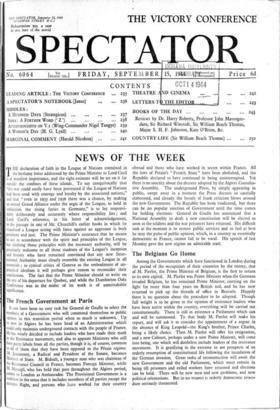The Belgians Go Home
Among the Governments which have functioned in London during the period of the occupation of their countries by the enemy, that of M. Pierlot, the Prime Minister of Belgium, is the first to return to its own capital. M. Pierlot was Prime Minister when the Germans invaded Belgium, he has remained Prime Minister, carrying on the fight for more than four years on British soil, and he has now returned to pick up the threads of office in Brussels. Happily there is no question about the procedure to be adopted. Though full weight is to be given to the opinion of resistance leaders who have been active within the country, everything will be carried out constitutionally. There is still in existence a Parliament which can and will be summoned. To that body M. Pierlot will make his report, and will ask it to consider the appointment of a regent in the absence of King Leopold—the King's brother, Prince Charles, being a likely choice. Then M. Pierlot will offer his resignation, and a new Cabinet, perhaps under a new Prime Minister, will come into being, one which will doubtless include leaders of the resistance movement. It is gratifying in the extreme to see prospects of an orderly resumption of constitutional life following the inundation of the German invasion. Great tasks of reconstruction will await the new Government and the old Parliament, which must remain in being till prisoners and exiled workers have returned and elections can be held. There will be new men and new problems, and new political orientations. But in no respect is orderly democratic proce. dure seriously threatened.






















